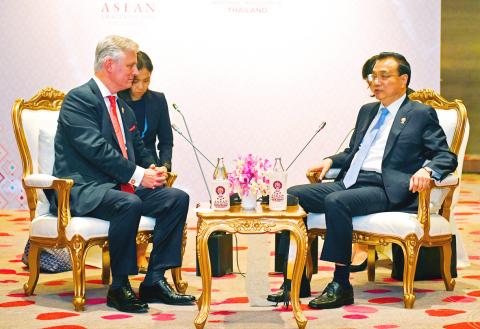The US on Monday accused China of intimidation in the South China Sea as it put forward its strongest language yet rejecting Beijing’s claims to the strategic, dispute-rife waters.
The Pacific powers traded tit-for-tat barbs over the South China Sea at a regional summit in Bangkok, with Beijing accusing Washington of ratcheting up tensions in the waters, a key global shipping route.
Beijing claims huge swathes of the sea, where it is accused of building military installations and fake islands — and ramming fishing vessels.

Photo: Reuters
US National Security Adviser Robert O’Brien highlighted the right of freedom of navigation as he led Washington’s delegation to the ASEAN summit and parallel East Asia Summit.
“Beijing has used intimidation to try and stop ASEAN nations from exploiting their offshore resources,” he said, addressing an ASEAN meeting on Monday.
“Big countries should not bully other countries,” he later told reporters.
As the summit was wrapping up, the US Department of State released a report on its Asia-Pacific strategy with unusually strong language denouncing China’s basis for its claims — the so-called “nine-dash line.”
Beijing’s “maritime claims in the South China Sea, exemplified by the preposterous ‘nine-dash line,’ are unfounded, unlawful and unreasonable,” the report said.
US leaders have been taking an increasingly sharp tone on China, but have generally focused on encouraging all claimants to resolve disputes peacefully, rather than Washington taking a position itself.
Beijing claims the majority of the South China Sea through the “nine-dash line,” a vague delineation based on maps from the 1940s.
Taiwan, Vietnam, the Philippines, Malaysia and Brunei all have rival claims to all or parts of the South China Sea.
Asked about the US’ comments at the ASEAN summit, Chinese Vice Minister of Foreign Affairs Le Yucheng (樂玉成) accused some outside countries of “meddling” in the sea.
“Some non-regional countries cannot live with calm waters in the South China Sea and have come all this way to make waves,” Le said, in an apparent jab at the US.
In return, O’Brien later said that “we don’t think we’re meddlers.”
“We always come when we’re invited, unlike other countries,” he said after Le’s comments emerged.
Despite the strong language from the US in the report, some observers questioned its level of commitment.
O’Brien was the lowest-ranking official ever sent by the US to an East Asia Summit since Washington successfully won an annual invitation in 2011.
The summits are usually attended by heads of state, but a US official said that US President Donald Trump — who on Saturday watched a mixed martial arts championship in his home city of New York — was busy with campaign events.
However, the report said that the US was stepping up its engagement with key partners in Asia, including India and allies Japan and South Korea.
“We are committed to upholding a free and open Indo-Pacific in which all nations, large and small, are secure in their sovereignty and able to pursue economic growth consistent with international law and principles of fair competition,” the report said.

AIR SUPPORT: The Ministry of National Defense thanked the US for the delivery, adding that it was an indicator of the White House’s commitment to the Taiwan Relations Act Deputy Minister of National Defense Po Horng-huei (柏鴻輝) and Representative to the US Alexander Yui on Friday attended a delivery ceremony for the first of Taiwan’s long-awaited 66 F-16C/D Block 70 jets at a Lockheed Martin Corp factory in Greenville, South Carolina. “We are so proud to be the global home of the F-16 and to support Taiwan’s air defense capabilities,” US Representative William Timmons wrote on X, alongside a photograph of Taiwanese and US officials at the event. The F-16C/D Block 70 jets Taiwan ordered have the same capabilities as aircraft that had been upgraded to F-16Vs. The batch of Lockheed Martin

GRIDLOCK: The National Fire Agency’s Special Search and Rescue team is on standby to travel to the countries to help out with the rescue effort A powerful earthquake rocked Myanmar and neighboring Thailand yesterday, killing at least three people in Bangkok and burying dozens when a high-rise building under construction collapsed. Footage shared on social media from Myanmar’s second-largest city showed widespread destruction, raising fears that many were trapped under the rubble or killed. The magnitude 7.7 earthquake, with an epicenter near Mandalay in Myanmar, struck at midday and was followed by a strong magnitude 6.4 aftershock. The extent of death, injury and destruction — especially in Myanmar, which is embroiled in a civil war and where information is tightly controlled at the best of times —

China's military today said it began joint army, navy and rocket force exercises around Taiwan to "serve as a stern warning and powerful deterrent against Taiwanese independence," calling President William Lai (賴清德) a "parasite." The exercises come after Lai called Beijing a "foreign hostile force" last month. More than 10 Chinese military ships approached close to Taiwan's 24 nautical mile (44.4km) contiguous zone this morning and Taiwan sent its own warships to respond, two senior Taiwanese officials said. Taiwan has not yet detected any live fire by the Chinese military so far, one of the officials said. The drills took place after US Secretary

THUGGISH BEHAVIOR: Encouraging people to report independence supporters is another intimidation tactic that threatens cross-strait peace, the state department said China setting up an online system for reporting “Taiwanese independence” advocates is an “irresponsible and reprehensible” act, a US government spokesperson said on Friday. “China’s call for private individuals to report on alleged ‘persecution or suppression’ by supposed ‘Taiwan independence henchmen and accomplices’ is irresponsible and reprehensible,” an unnamed US Department of State spokesperson told the Central News Agency in an e-mail. The move is part of Beijing’s “intimidation campaign” against Taiwan and its supporters, and is “threatening free speech around the world, destabilizing the Indo-Pacific region, and deliberately eroding the cross-strait status quo,” the spokesperson said. The Chinese Communist Party’s “threats